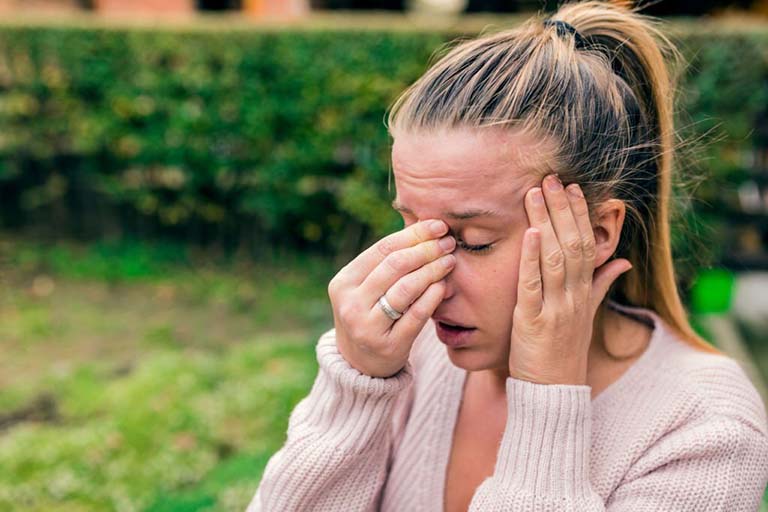Sinus or sinusitis infections can make it hard to breathe, pressure on your face can hurt, and also make you cough and produce a lot of discharge. At this point, you may wonder about transferring this painful disease to someone else.
But Sinus or Sinusitis can be attacked, but some other factors as well. It is contagious, but it does not ensure another person will have a sinus infection.
In addition, many people have chronic Sinusitis that lasts 12 weeks. Allergies like Polyps tissue growths in the nose or a crooked wall between the nostrils cause this type of sinus. Sometimes smoke, dry air, or polluted air can also be the reason for Sinusitis.
Transmission Of Sinus Infections
Sinuses are air-filled pockets of the nasal region that encounter the bony structure of the cheek, behind the eyebrows, and on the bridge of the nose. Sinus infections occur when fluid or mucus is entrapped in the sinuses; germs start to grow.
This leads to a sinus infection. There could be many underlying cause of sinus infections, but typical sinus infections are caused by many factors, including;
- Viruses, such as cold or flu
- Bacteria
- Fungi
- Nasal polyps
- Nasal tumors
- Allergies
- Deviated septum - a crooked septum that makes one nostril bigger than the other.
There are two types of Sinus infections.
- Bacterial sinus infection or bacterial sinusitis.
- Viral infection or Viral sinus infection.
Virus Causes Sinus Infection Contagious.
Are sinus infections contagious? Yes, it is transferable if it is a viral sinus infection. Most sinus infections are contagious. But everybody doesn't develop sinus infection from others. In most cases, it can only be a cold infection. And after some time, the cold may turn into a sinus infection, but this is not certain.
People can spread the virus through the air when they sneeze or cough. That's why it is best to cover your mouth and face while sneezing to stop spreading the virus.
Apart from sneezing, a sick person can spread the virus by touching any material thing like a doorknob when they touch their mouth and nose with bare hands when they have coughed or sneezed.
To reduce the contagion, one should use the elbow crook to hide their face or mouth while sneezing or coughing. And avoid secondhand smoke, especially from an affected person.
Bacteria Causes Sinus Infection Contagious
Bacteria can also cause sinus infections. But the bacterial infection is not contagious. These bacterial sinus infections can't be transferred to other human bodies. However, these types of sinus infections are rare and only 0.5 to 2% of people can get it.
Our readers may be confused by reading this far and will assume whether we are talking about covid or sinus infection. Don't worry because it is not covid infection. We will briefly discuss covid vs sinus infection in the below sections of this article.
Common Symptoms Of Sinus Infection

Sinus infection symptoms are similar to any common cold symptoms or flu infection. They are:
- Pain or pressure in the sinuses.
- Pain on the forehead, around the eyes, outside of the nose, or at the jaw structure.
- Severe or mild headache
- Runny or stuffy nose
- Lack of smell
- Changes in color in nasal discharge like thick, yellow, green, or cloudy nasal discharge
- Postnasal drip
- Mucus or fluid goes down the throat from the nose.
- Sore or irritated throat
- Cough
- Facial pain
- Bad breath
- Fever - high or mild
- Fatigue
Treatment At Home For Sinus Infection

If your bacterial sinus infected you, then you have to take antibiotics. Otherwise, plenty of options in your home can help you relieve a sinus infection. Let's discuss the following:
Drink Water To Hydrate Your Body.
You need o flush the virus out of your body. Thus, you need more water to drink. An adequate amount of water will help you to hydrate. Fix the target. Drink 8 ounces of water every 2 hours, even if you don't get thirsty.
Stay away from things that can irritate the sinuses, like cigarette smoke, or strong perfumes.
Take antibacterial Food
Antibacterial food like garlic, ginger, lemon, and onions help reduce aches or inflammation. Drink ginger tea, lemon tea, honey lemon water, or just raw honey. Add honey and raw ginger garlic to your meal, as these ingredients have antioxidants and antibacterial and antifungal properties to help your sinus problem.
Use Eucalyptus oil
Eucalyptus oil work very effectively in opening up the sinuses and getting rid of mucus. Research has found that the main ingredient in eucalyptus oil helped people with critical Sinusitis to recover faster.
Use eucalyptus oil externally on the nose bone or temples, chest, and inhale deeply. Add this oil to boiling water in a diffuser and inhale. These home remedies will help to alleviate sinus.
But, use only food-graded Eucalyptus oil.
Use A Neti Pot
Use a neti pot with a mixture of saline solution. It can help to get rid of mucus. Regular use of neti pot on both nostrils will cause mucus drainage and clear the stuffed nose, and you can breathe easily.
When the mucus gets flushed with saline solution, you feel lighter, and it removes the headache.
Neti pot is helpful, especially for children who have a sinus infection.
Hydrated Sinuses
Hydration can help relieve facial pressure.
- Use a humidifier at night. Humidifier works better in relieving nighttime nasal blockages.
- During the daytime, use nasal saline spray. Try to use natural saline nasal spray. However, saline nose spray may work for the time being. Avoid a saline spray for nose that contains Oxymetazoline.
- Take steam at least 2 to 3 times a day. Fill a bowl with boiling water and rest your head over it for 10 minutes. Cover your head with a bowl with a thick towel so the steam can't be exposed to the outside.
Time To Seek Help From A Doctor
It is time to consult with a doctor when you are going through these mentioned symptoms:
- 100.4°F temperature or higher
- Symptoms lasted for more than 10 days
- Symptoms are getting worse
Take OTC- Over The Counter Medication For Sinus Infections
Use otc medications to relieve headaches, facial pressure, or neck and nose pain. There over the counter medications are
- Aspirin
- Tylenol - Acetaminophen
- Advil, Motrin - Ibuprofen.
Conclusion
So, if you ask, are sinus infections contagious? Then this content has answered the question already.
Sinus infection is one of the significant health problems in the United States. It affects nearly 31 million people. 1 out of every 7 adults in America feels this nasal pain pressure yearly.
Surgery is the solution if drugs and medicine fail to treat the sinus. It is performed by an otolaryngologist, and anatomical defects are the most common target of surgery.
The surgeon can repair the defects in the bone separating the nasal passages. They remove nasal polyps and open up sealed passages.
Frequently Asked Question
Question 1: What is Chronic Sinusitis Or Acute Sinusitis?
A sinus infection for more than eight weeks or more indicates chronic Sinusitis. Also, more than four sinus infections per year are signs of chronic Sinusitis. Common reasons for chronic Sinusitis are
- Allergies
- Nasal growths,
- Respiratory tract infections.
Question 2 - Rhinitis vs Sinusitis
Answer 2: Some people get confused about whether they have rhinitis or Sinusitis.
Rhinitis often causes by allergies or hay fever, including sneezing, an itchy nose, and watery eyes. Nasal discharge is generally clear in the case of rhinitis.
Sinusitis is quite different from rhinitis because of the nasal discharge. The nasal discharge color would be green or yellow.
It is more likely to be attended by a fever, headache, and sinus pressure.
Question 3 - Do Sinus Infections Go Away On Their Own?
Answer 3: Most infections caused by a virus. Therefore sinus infections go away on their own. Sinus usually clears up on its own within 2 to 3 weeks. But medicines can help in recovering from sinus quickly.
Question 4: How Long Is A Sinus Infection Contagious?
Answer 4: A sinus infection can last about seven to ten days. That means it is contagious with the virus for up to two weeks.
Question 5 - Covid vs sinus infection
Answer 5: In COVID-19 infection, there will be more dry cough, runny nose, loss of taste and smell, and respiratory symptoms.
On the other side, Sinusitis causes more discomfort in the forehead and face, congestion, nasal drip, and facial pressure.


